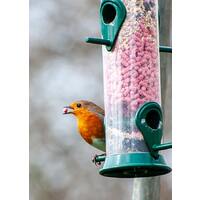How Many Pellets Should I Feed My Birds
Author: Pet Station Date Posted: 14 December 2021

Are pellets good for your birds? How can you help your bird transition to pellets? In this blog, we will answer many of your questions about bird food pellets and your bird’s diet. We'll be tackling nutrition, portion control, feeding techniques and more to keep your pet birds happy and healthy!
What Are Bird Pellets?
Bird pellets are a type of food specifically formulated for a bird's diet. The same way kibbles are made for dogs and cats, these pellets cater to the specific nutritional needs of our pet birds. Typically containing fruits, vegetables, seeds, grains and proteins, these small nibbles are packed with vitamins and minerals to help your pet birds live a healthier and longer life.
Are Bird Pellets Good for Birds?
Because pellets are formulated based on a pet bird's diet, they are an ideal choice for a well-balanced and nutritionally complete food when paired with fruits and vegetables. These tiny pellets supply all the nutrition required in your bird's diet, so you can ensure they stay strong and healthy.
Another benefit of pellets is that they train your birds not to cherry-pick their food. Since pellets are composed of various ingredients, all infused together in a single form, your bird gets a balance of nutrition in a single pellet. This pellet food can also come as a pelleted cube, a crumble, a cake, or even a mash food.
How Many Pellets Should I Feed My Birds?
Bird pellets should be given as complementary food, thus they should not replace fresh fruit and vegetables. You can also pair them with cooked grains, pasta, and legumes.
Research on avian diets says that approximately 40% of your bird's daily diet should be a good brand of food pellet. In contrast, the remaining 60% should be plant-based food such as raw, uncooked vegetables, low-sugar fruits, grains, herbs, sprouts, and nuts. The more diverse the plant-based diet a bird has, the better.
What If Your Bird Won't Eat Pellets?
Are you having difficulties feeding your bird pellets? Some birds take to a new diet effortlessly, while others may take a little more convincing. That's because their instinct tells them not to eat unnatural and unfamiliar food, unless they know it is safe to consume. Hence, you can encourage them by pretending to be eating their pellets right in front of them.
Will My Bird Starve to Death?
Many birds are hesitant to change their diet independently. And yes, they may refuse to eat anything if they undergo drastic dietary changes. That's why it's essential to condition your bird to eat healthily and not starve itself. New habits take time, so you have to be patient.
Make sure to monitor your bird's weight at least a few times a week while making a diet change. Regular weighing will tell you if your bird is eating or not. For more accurate monitoring, check its weight at the same time of day using an accurate bird scale.
How Do I Help My Bird Transition to Pellets?
Before changing your bird's diet, it's best to visit your avian veterinarian for your bird's wellness check-up and a consultation about their diet. This is to ensure your bird is healthy enough to tolerate the dietary change. They will let you know if your bird is overweight or has pre-existing organ damage from a fatty seed diet. Then, get some recommendations and ask for special dietary requirements, such as fat intake, higher need for calcium and more.
You'll also need to get a baseline weight, so you'll know if your bird is eating correctly. A reliable bird scale can easily monitor your bird's weight in grams every week, allowing it to let you know if your bird is tolerating the dietary changes.
Shop Premium-Quality Bid Pellets at Pet Station
For your feathered friends, make sure to get super healthy and nutritious food pellets at Pet Station! You'll discover a wide selection of premium-quality pellets, perfect for any age, size, or bird species. Our bird pellets are also tailored for a wide variety of specialty diets, so you can accommodate your bird’s needs. Shop your bird food pellets now at Pet Station for healthier, happier feathered friends.





